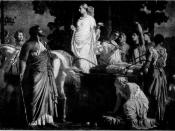?? and he sacked cities for loot for income, killed dozens of men for revenge, slept with multiple women for pleasure, and sometimes raped them if they were unwilling...?
Quite a dreamy paradise, isn?t it? For many this simple and crude life presents the utopian world. Others shudder at it believing it represents the worst of humankind and decadent living of the past. Some read on wishing they lived in such times, while others read on to see from what horrible social ideals did our great ?ethical? society rise. In the times depicted in The Odyssey, the Ancient Greek mind differs from modern society and conformities in three major areas: warfare, honour, and sex. Dream or Nightmare, heaven or hell, and whether it entrances the reader with bliss or transfixes the reader with horror, the Odyssey keeps its reader intrigued and bound in its spell.
Perhaps the most distinguishing characteristic of the age depicted in The Odysseus that differed from the modern era, was the role that the code of honour played then.
The general rules of honour of the time were very much similar to our social conformities, but the differentiating part is the penalty for violating that code and the penalty for violating modern social rules. Today, we do have many social conformations, but the results for overstepping them are miniscule. For offending someone by courting his wife you will get an outraged yelling and maybe several bruises. Perhaps you might overstay your welcome at someone?s house and eat and drink their cellars empty; your pardon will be asked for the household no longer being able to feed you. Not extremely harsh penalties. In the time of Odysseus, however, honour and status were bound hand-in-hand and without one, you had neither. Honour was of the highest importance,


